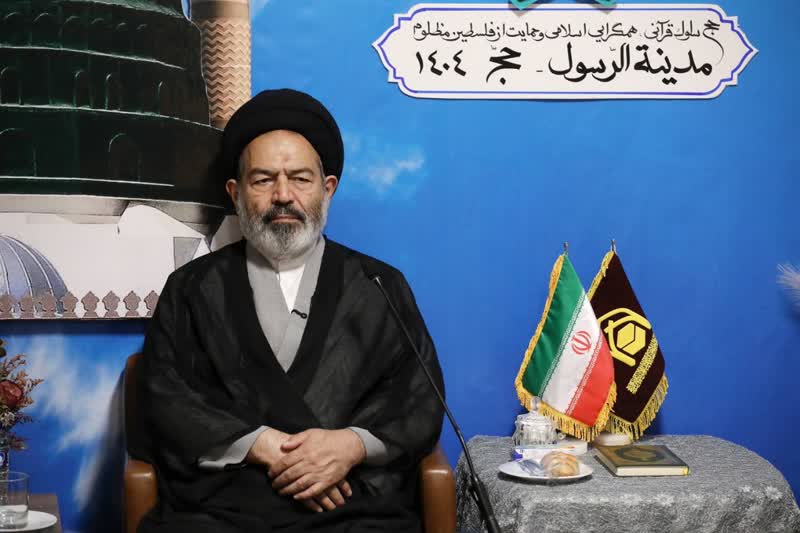Head of Iranian Hajj Pilgrims: Imam (RA) and Leader of the Revolution Neutralized Illusion of Ill-Wishers That Shiites Are Far From Quran
A group of Quran reciters who have traveled to the land of revelation as part of the Noor group for Hajj Tamattu 1404, met with Hojjat al-Islam Seyed Abdolfattah Navvab, the representative of the Supreme Leader for Hajj and Pilgrimage Affairs and head of Iranian pilgrims.
This group of 20 people included a group of distinguished reciters from Iran, some of the complete memorizers of the Holy Quran, as well as members of the International Noor Recitation Group from different parts of Iran. The reciters, by attending the gatherings for familiarization with the Holy Quran, gatherings for familiarization and knowledge, and some other cultural programs of the Iranian caravans in Medina and Mecca, give a special Quranic atmosphere to the ceremonies and strengthen the pilgrims' familiarity with the Holy Quran, this great and eternal miracle of the Holy Prophet (PBUH).
Holding the ceremonies in an interactive manner and the pilgrims' participation in these programs are among the outstanding features seen in this year's programs, and this also increases the attractiveness of these programs.
After the speeches of a number of participants in this meeting, Hojjat al-Islam Navvab, referring to the policies of the ill-wishers of Islam to instill the illusion of the separation of Shia from the Quran and to create a distance between the Sunnis and the followers of the infallible and pure Ahl al-Bayt (AS), noted: This has been a central policy for the ill-wishers of Islam throughout history, especially in the last century, to insinuate that Shia is only linked to Ahl al-Bayt (AS) and has no relation to the Holy Quran; but due to the character of Ahl al-Bayt and the scholars of Shia history and the measures of Imam Khomeini (RA) and the Supreme Leader, this conspiracy and propaganda was thwarted.

Regarding the special attention of Shia to the Quran, he mentioned several historical examples from the beginning of Islam to contemporary history, and said: There are many examples of this issue, but for example, one of the characteristics of Ms. Fazah, the maidservant of Hazrat Seddiqah Tahirah (AS), was to speak with the Quran, and she spent two decades of her life in such a way that many of her speeches and answers to questions were based on verses of the Holy Quran. Or in the present era, we see that when Seyed Mohammad Hossein Tabatabaei (Hafiz al-Quran) came to Saudi Arabia, in a meeting attended by some Saudi officials, answered questions with the Quran, and many of the attendees were surprised by his level of mastery of the Quran.
The head of Iranian pilgrims, emphasizing the need to continuously strengthen the connection with the Holy Quran, noted that in order to deepen this connection, initiatives should be increased and made more attractive day by day.
Hojjat al-Islam Navvab also said that although the number of attendees at the programs is very important, the quality of the work is of greater importance, and for this reason, serious attention should be paid to effectiveness in the ceremonies.
He advised the reciters present at the meeting to pay special attention to promoting the character and ethics of the Prophet Muhammad (PBUH) in their Quranic propagations in Medina, because hearing a verse and reflecting on it may transform a person's life.
The head of Iranian pilgrims also advised the reciters to pay close attention to the character and character of Prophet Abraham (PBUH) as the founder of the Kaaba in Mecca.







